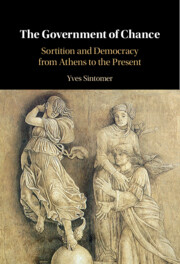Book contents
- The Government of Chance
- The Government of Chance
- Copyright page
- Dedication
- Contents
- Tables
- Acknowledgments
- Note on the Text
- Introduction
- 1 Democracy, Modern and Ancient
- 2 Sortition’s Second Birth in the Middle Ages and the Early Modern Period
- 3 The Disappearance of Sortition in Politics
- 4 The Return of sortition
- 5 Sortition and Politics in the Twenty-First Century
- References
- Index
1 - Democracy, Modern and Ancient
Published online by Cambridge University Press: 18 February 2023
- The Government of Chance
- The Government of Chance
- Copyright page
- Dedication
- Contents
- Tables
- Acknowledgments
- Note on the Text
- Introduction
- 1 Democracy, Modern and Ancient
- 2 Sortition’s Second Birth in the Middle Ages and the Early Modern Period
- 3 The Disappearance of Sortition in Politics
- 4 The Return of sortition
- 5 Sortition and Politics in the Twenty-First Century
- References
- Index
Summary
Chapter One discusses the contrasts between ancient and modern democracies. First, it describes the current crisis of political representation, the causes of which are structural in nature. After briefly outlining the potential scenarios of postdemocracy and authoritarianism in the Global North, it examines in greater detail a counter-hegemonic project that especially relies upon democratic innovations and aims at democratizing democracy. It then proceeds with an overview of how selection by lot operated in Antiquity, a crucial reference point for advocates of sortition. Describing its political use in ancient western Asia, it elucidates how after Aquinas, two types of sortition came to be differentiated, divinatory and distributive, in addition to the procedure’s use in games of chance or science. Although it partly emerged from divinatory practices, sortition became a secular practice during its Golden Age in Athens, a distributive democracy in which the legitimacy of sortition derived from its impartiality and its radical democratic logic. Political sortition was widespread in Rome but quite different, with a ritual and symbolic dimension that enabled peaceful competition among elites in the name of the Republic and the common good. These contrasting examples establish the fact that sortition can be used according to diverse rationales.
Keywords
- Type
- Chapter
- Information
- The Government of ChanceSortition and Democracy from Athens to the Present, pp. 17 - 65Publisher: Cambridge University PressPrint publication year: 2023



